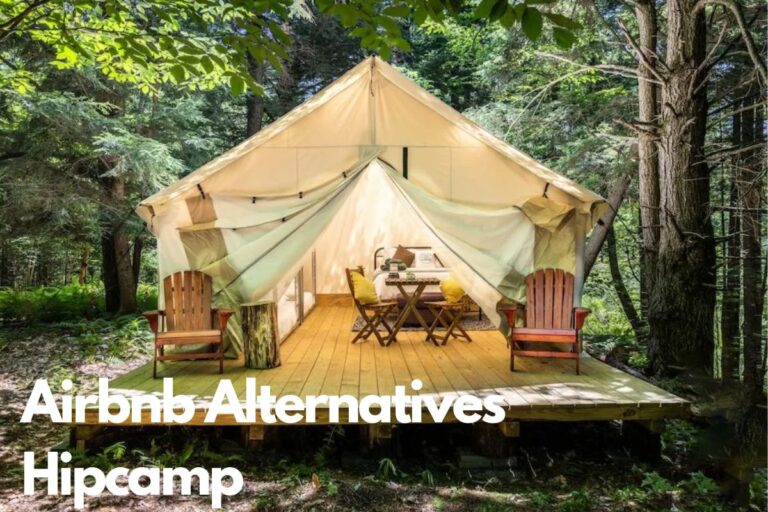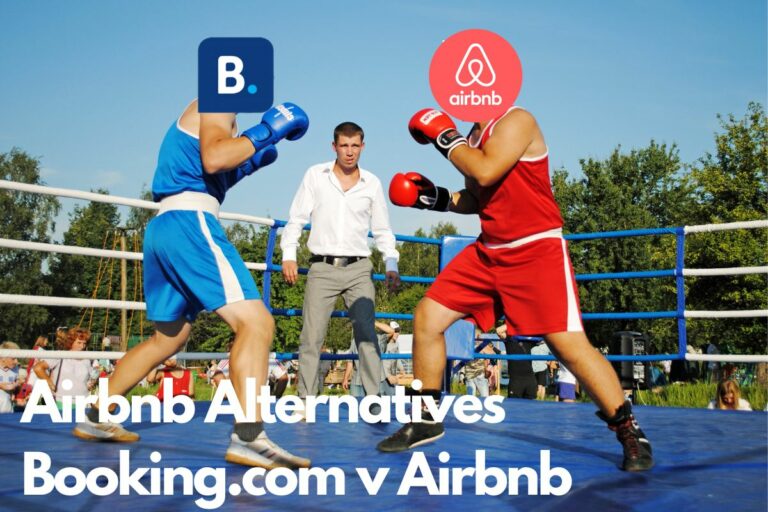Airbnb Alternatives – Airbnb v Vrbo – A Guide for Savvy Travelers!
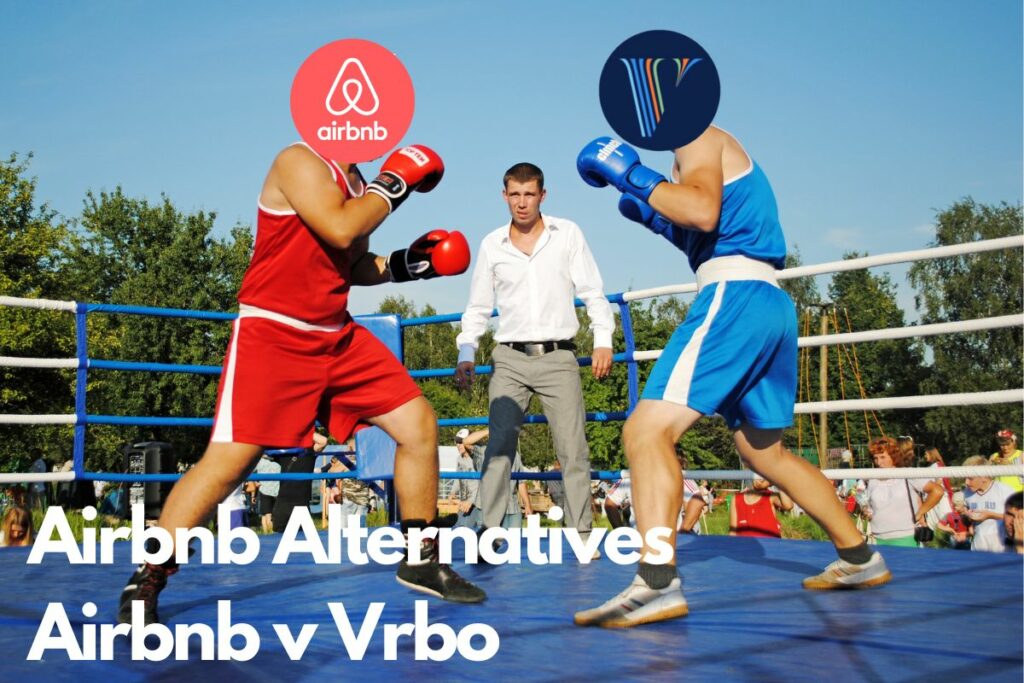
In this article, we will compare and contrast Airbnb v VRBO to help guests make informed decisions.
Highlights
I looked at 81,734 high-season price comparisons between Airbnb and Vrbo. These were the same properties, same dates, and same number of guests, for 7 days or more.
Airbnb was, on average, 13% cheaper in 13% of cases, but Vrbo was, on average, 12% cheaper in 87% of cases.
- In the vast majority of cases, Vrbo was cheaper.
- Very rarely were the prices the same on both platforms
- There are no hard and fast rules as to which platform is cheaper for any particular property
- In some ultra high-end cases, I found price differences of over $100,000 dollars!
- It very much pays to check pricing between platforms before you book.
- The average saving that I found was 13%
Note. The average booking spend is around $1,000 (4 nights at $250), so if a property is listed on both Airbnb and Vrbo, average savings are around $130 if you take the time to shop around.
The Rise of Online Vacation Rental Platforms
In the last two decades, the travel and hospitality industry has witnessed a revolutionary change, primarily driven by the advent of online vacation rental platforms. This transformation began in the early 2000s, a period marked by the rapid growth of internet accessibility and the emergence of e-commerce.
One of the very first players in this space, was VRBO (Vacation Rental By Owner), which introduced (in 1995) a novel idea: allowing property owners to list their homes online for short-term rental. This allowed homeowners to earn additional income and offered travelers an alternative to traditional hotel stays.
These platforms catered to a growing desire among modern travelers for more personalized, home-like, and often more affordable accommodation options. The real game-changer, however, came with the launch of Airbnb in 2008. Airbnb revolutionized the concept by making connecting hosts and guests easier and more user-friendly.
Airbnb’s innovative approach to leveraging technology to foster trust and community among users helped it quickly gain popularity. Airbnb expanded the market by offering whole homes and unique shared spaces, transforming how people travel and interact with local communities.
As we delve deeper into the comparison between Airbnb and VRBO, two of the most prominent players in this market, it’s essential to understand this background and how these platforms have evolved to meet the changing needs of modern travelers.
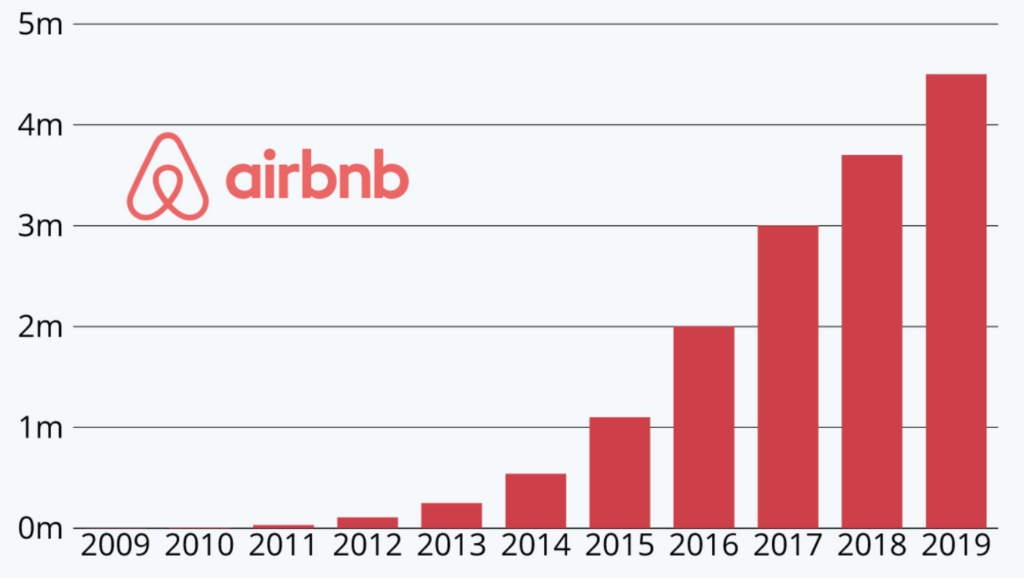
Company Background – Airbnb
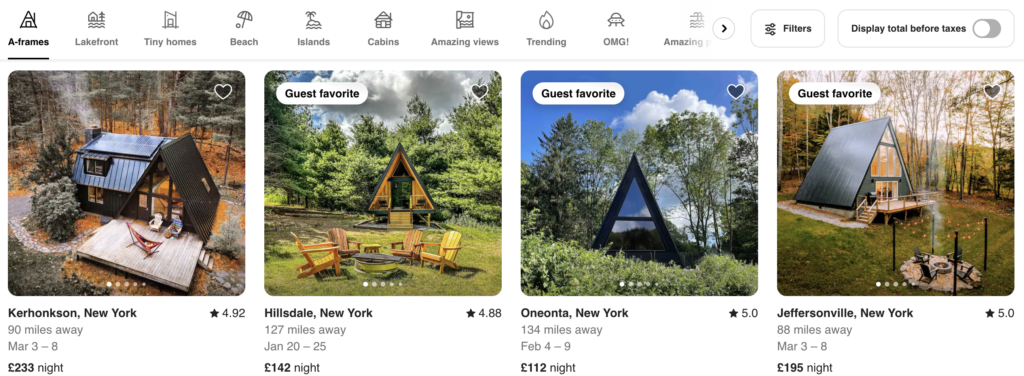
Airbnb, an abbreviation for “Air Bed and Breakfast,” was founded in 2008 by Brian Chesky, Joe Gebbia, and Nathan Blecharczyk in San Francisco, California. The concept originated when Chesky and Gebbia rented out air mattresses in their apartment to local conference attendees due to a shortage of hotel rooms. This simple idea of offering short-term, peer-to-peer lodging became a global phenomenon.
Business Model:
Airbnb operates on a platform business model, acting as an intermediary between hosts who want to rent out their spaces and guests looking for accommodation. The company does not own any of the real estate listings on its platform. Instead, it earns revenue by charging service fees to both guests and hosts for each booking. This model has allowed Airbnb to scale rapidly without the capital expenditures typically associated with traditional hospitality businesses.
Global Reach and Listings:
As of April 2023, Airbnb has dramatically expanded its global presence. The platform boasts over 7 million listings in more than 100,000 cities worldwide. This range includes everything from single rooms to castles, spanning pretty much every property type and experience.
User Base:
Airbnb’s user base is equally impressive, with millions of active users. The platform has served over 800 million guests since its inception, a testament to its widespread popularity and acceptance. The user-friendly interface and two-way review system have helped Airbnb build a trusted community of users. The platform caters to leisure and business travelers, offering unique stays that provide a more local and personal experience than traditional hotels.
Innovation and Expansion:
Airbnb has continually innovated, expanding beyond accommodation to offer Airbnb Experiences – activities designed and led by locals. The company has also ventured into luxury travel with Airbnb Luxe and has made strides in sustainable tourism. In summary, Airbnb’s journey from a simple room-renting idea to a global powerhouse in the travel industry is a remarkable story of innovation, adaptability, and understanding of the evolving needs of modern travelers. Its business model, emphasizing community, trust, and unique experiences, has disrupted traditional hospitality and redefined how people travel.
Company Background – Vrbo
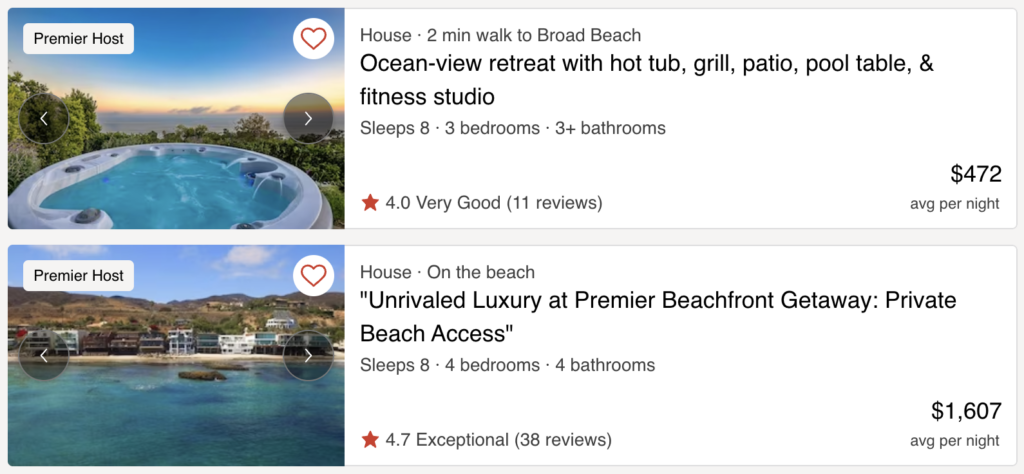
VRBO, which stands for Vacation Rentals by Owner, was founded in 1995, making it one of the pioneers in the online vacation rental industry. The company started as a service to connect homeowners looking to rent out their vacation properties with travelers seeking accommodations. VRBO grew steadily over the years, and in 2006, it became a part of the HomeAway family of brands. In 2015, HomeAway, including VRBO, was acquired by Expedia Group, a global travel technology company.
Business Model:
VRBO operates on a similar online marketplace model as Airbnb but with a distinct focus. The platform primarily lists entire homes, offering a range of properties such as houses, apartments, condos, and villas. VRBO generates revenue by charging homeowners a fee to list their properties and also takes a commission from each booking. This model appeals to travelers seeking private, whole-property rentals, differentiating VRBO from shared accommodation platforms.
Global Reach and Listings:
VRBO has a significant global presence, though not as extensive as Airbnb. The platform offers over 2 million properties in 190 countries. VRBO’s listings are concentrated in key vacation destinations worldwide, catering to travelers who prefer the privacy and amenities of a full home.
User Base:
VRBO has cultivated a loyal user base, particularly among families and groups who value the space and facilities of renting an entire home. The platform is known for its family-friendly properties and has become a go-to for travelers seeking accommodation for larger groups. VRBO’s commitment to whole-property rentals has helped it maintain a distinct position in the short-term rental market.
Market Position and Strategy:
Under the umbrella of Expedia Group, VRBO benefits from the parent company’s resources and expertise in the travel industry. The platform has focused on enhancing user experience, trust, and safety, which are crucial in the vacation rental market.
In summary, VRBO’s history as a trailblazer in the vacation rental industry and its acquisition by Expedia Group has positioned it as a significant player. Its business model, focusing on whole-home rentals, appeals to a specific segment of travelers and distinguishes it from competitors like Airbnb. VRBO’s global reach, extensive listings, and dedicated user base underscore its impact and success in the travel and hospitality sector.
Types of Accommodations Offered by Airbnb

Airbnb has revolutionized the travel accommodation industry by offering an incredibly diverse range of lodging options. This variety caters to a wide spectrum of traveler preferences and budgets, making it a popular choice for many.
Here’s an overview of the types of accommodation you can find on Airbnb:
Shared Rooms: Ideal for budget travelers, these are shared spaces where guests might share a room or common areas with others, including the host.
Private Rooms: Guests have a private room but might share other spaces like the kitchen or living room with the host or guests.
Entire Homes/Apartments: These listings offer the whole place to the guest, ensuring complete privacy. They range from modest apartments to family-sized homes.
Luxury Homes: Airbnb’s luxury segment includes high-end homes and villas, often equipped with premium amenities and services. These are part of the ‘Airbnb Luxe’ category, featuring exceptional residences in remarkable locations.
Airbnb offers a massive range of accommodation:
Treehouses: For those seeking a whimsical and close-to-nature experience, treehouses on Airbnb range from rustic to luxurious.
Boats: From stationary houseboats to yachts, these water-based accommodations offer a unique stay, often in stunning locations.
Historic Homes: Airbnb lists many properties with historical significance, offering guests a chance to experience a piece of history.
Castles: For a truly royal experience, guests can rent entire castles in various parts of the world.
Domes and Geodesic Houses: These are for guests looking for a modern, architecturally interesting experience.
Tiny Houses: Reflecting a growing trend, these compact and efficient spaces offer a minimalist, eco-friendly stay.
Farm Stays: These accommodations offer a rustic and authentic experience on working farms, often with opportunities to interact with animals and nature.
Airbnb’s offerings cater to virtually any taste, making it a versatile choice for accommodation across the globe.
Types of Accommodation Offered by Vrbo

VRBO is known for its wide array of private, whole-property accommodations. Here’s a brief overview of the types of accommodation you can find on VRBO:
Whole Houses: The core of VRBO’s offerings, these listings provide entire homes to guests, ensuring privacy and space. They range from modest-sized houses perfect for small families or groups to larger homes that accommodate bigger gatherings.
Condos and Apartments: Ideal for urban or resort destinations, these properties offer the comforts of home with the amenities often found in apartment complexes, like pools or fitness centers.
Luxury Homes: For those seeking a more opulent experience, VRBO offers a selection of luxury homes. These properties often come with high-end amenities, extra space, and sometimes unique locations or architectural significance.
Unique Accommodations:
Cabins and Cottages: Perfect for a cozy, rustic getaway, these properties are often found in scenic areas like mountains or forests or next to lakes.
Beachfront Properties: These listings offer direct access to beaches and ocean views from small beach cottages to large waterfront homes.
Villas: Often located in exotic or resort destinations, villas on VRBO provide a luxurious and private escape.
Barns: Converted barns offer a unique and charming stay, combining rustic appeal with modern amenities.
Boats and Houseboats: For a different experience, guests can stay on stationary boats or houseboats, enjoying life on the water.
Castles: In some regions, VRBO lists castles or castle-like properties, offering a unique and historic experience.
Listing Numbers – Airbnb v Vrbo
At the time of writing (Jan 2024), HiChee shows 7,333,116 Airbnb listings and 2,141,657 Vrbo listings.
Interestingly enough, 865,873 of those listings appear on both Airbnb and Vrbo, so it always pays to check booking options on HiChee’s individual price comparison reports, as they are rarely listed at the same price on both websites.
The price difference between platforms can be huge.
How To Price Check On HiChee
Booking Process and User Experience – Airbnb v Vrbo
Booking Process
I could write a lot about the booking processes and user experiences of both platforms, but, to be honest, there isn’t much difference between the two. Airbnb and Vrbo have both dialed in the booking process so that it can best be described as simple and seamless.
Find a property you like, add your preferred dates, enter the number of guests, and book your stay.
The only caveat is that, as I mentioned before, it’s best to do a price check on HiChee.com to ensure you aren’t overpaying.
User Experience
Both platforms have fantastic mobile apps and desktop websites.

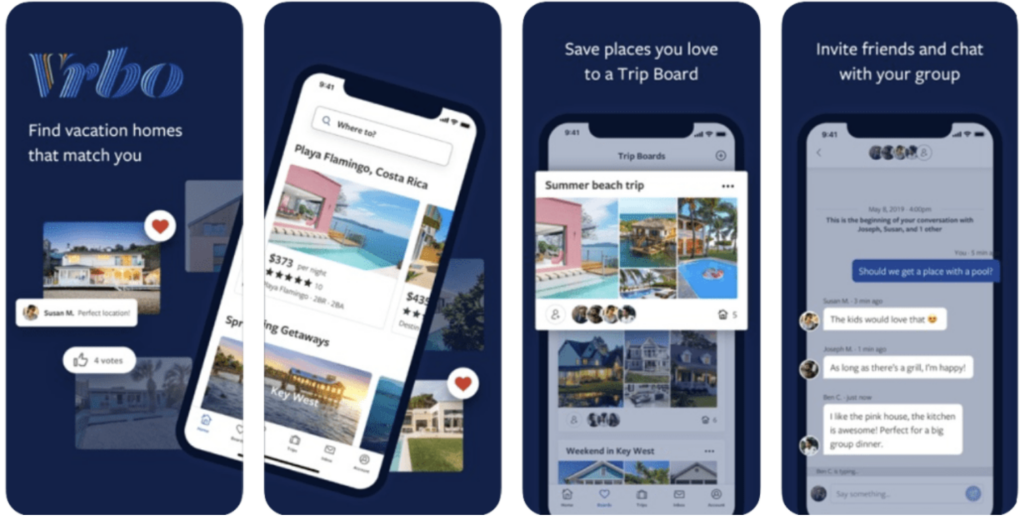
Pricing and Fees – Airbnb v Vrbo

Pricing Structure of Airbnb
Airbnb’s pricing structure is designed to be flexible, catering to a wide range of properties and hosts. Here’s a brief overview of how pricing works on Airbnb, including additional fees:
Base Price:
Set by the host, the base price can vary significantly depending on the type of accommodation, location, season, and amenities offered. Hosts have the flexibility to set different prices for different days or times of the year, often increasing rates during peak travel seasons or special events.
Service Fees:
Airbnb charges a service fee to both guests and hosts (although not in all cases).
Guest Service Fee: This fee is typically under 14.2% of the booking subtotal (the nightly rate plus cleaning fee and additional guest fee, if applicable, but excluding Airbnb fees and taxes) and is calculated based on factors like the length of stay and characteristics of the booking. This fee helps Airbnb run smoothly and offer 24/7 customer support.
Host Service Fee: Usually about 3% of the booking subtotal, this fee is lower to ensure hosts don’t bear too much of the cost. However, this can be higher for Airbnb Plus hosts, hosts with a Super Strict cancellation policy, and hosts in Italy.
Sometimes, the service fee is ‘paid by the host’, so no traveler fees are shown. The reality is that the traveler fees are added to the base price, so however it’s displayed, the traveler foots the bill.
When it comes to Airbnb Luxe properties, the service fee is 20%, paid by the host. But, again, these fees are passed on to the guest within the booking cost.
Cleaning Fees:
Hosts can choose to include a cleaning fee in their listing to cover the expenses of cleaning their space. This fee is set by the host and can vary widely. It’s a one-time fee charged per booking and is visible to guests before they book.
Additional Guest Fees:
Hosts have the option to charge extra if more than a certain number of guests stay. This is to accommodate additional costs associated with larger groups.
Security Deposit:
Some hosts require a security deposit for their listing, which is held until after the stay to cover any potential damages.
Local Taxes:
In some locations, Airbnb automatically collects and remits local taxes like occupancy tax, sales tax, or tourist tax on behalf of the host.
Airbnb’s pricing structure is designed to provide transparency and flexibility, allowing guests to understand the full cost of their stay upfront and hosts to adequately cover their expenses.

Pricing Structure of Airbnb
.
VRBO has a pricing structure is somewhat different from Airbnb, focusing primarily on whole-property rentals. Here’s a brief overview of VRBO’s pricing, including additional fees:
Base Rental Price:
The property owner or manager sets the base rental price on VRBO. This price can vary widely based on the property’s location, size, amenities, and the time of year. Like Airbnb, VRBO hosts often adjust their rates for peak travel seasons or special local events.
Service Fee:
VRBO charges guests a service fee, typically between 6% to 12% of the rental amount, excluding taxes and refundable fees. This fee is calculated based on several factors, including the total rental amount and the length of stay. The service fee helps VRBO cover the platform’s costs, including customer support.
Cleaning Fees:
Similar to Airbnb, hosts on VRBO can charge a cleaning fee to cover the cost of cleaning their property after a guest’s stay. The host sets this fee and can vary depending on the size and type of property. It’s a one-time charge per booking and is usually visible to guests before they complete their booking.
Additional Fees:
Booking Fee: Some hosts may charge a booking fee to cover administrative costs.
Additional Guest Fees: Hosts can also charge extra for additional guests if the number exceeds a certain limit set by the host.
Security Deposit:
Hosts on VRBO may require a security deposit, which is held and then released after the stay, provided there are no damages to the property.
Local Taxes:
Depending on the location, local taxes may be applicable. In some cases, VRBO collects and remits these taxes on behalf of the host.
Payment Processing Fee:
For hosts, VRBO may charge a payment processing fee for processing payments from guests.
VRBO’s pricing structure is designed to be transparent to guests, with most fees displayed upfront during the booking process.
Which platform is cheaper?
There’s no either-or answer to this question, but I can share some interesting data that will get your attention.
I looked at 81,734 high-season price comparisons between Airbnb and Vrbo. These were the same properties, same dates, and same number of guests, for 7 days or more.
Airbnb was, on average, 13% cheaper in 13% of cases, but Vrbo was, on average, 12% cheaper in 87% of cases.
- In the vast majority of cases, Vrbo was cheaper.
- Very rarely were the prices the same on both platforms
- There are no hard and fast rules as to which platform is cheaper for any particular property
- In some ultra high-end cases, I found price differences of over $100,000 dollars!
- It very much pays to check pricing between platforms before you book.
- The average saving that I found was 13%
Note. The average booking spend is around $1,000 (4 nights at $250), so if a property is listed on both Airbnb and Vrbo, average savings are around $130 if you take the time to shop around.

Host and Guest Policies
Airbnb
Airbnb has established comprehensive policies and requirements for hosts and guests to ensure a safe, reliable, and enjoyable experience for all parties involved.
Here’s a brief summary:
Host Requirements:
Hosts must provide accurate and up-to-date information about their space, including amenities, location, and any limitations or house rules.
Communication: Hosts must respond promptly to booking inquiries and guest questions.
Commitment to Reservations: Once a reservation is accepted, hosts are expected to honor the commitment unless there are extenuating circumstances.
Cleanliness: Hosts must adhere to Airbnb’s enhanced cleaning protocol, especially regarding health and safety concerns.
Safety: Ensuring the safety of the property by equipping it with essential amenities like a smoke detector, carbon monoxide detector, and a first aid kit.
Guest Policies:
Respect for Property: Guests are expected to treat the accommodation and neighborhood respectfully, adhering to the host’s house rules.
Communication: Guests should communicate any needs or issues promptly and clearly with the host.
Observance of Check-in and Check-out Times: Guests must adhere to the host’s specified check-in and check-out times unless otherwise arranged.
Cancellation Policies:
Airbnb offers several cancellation policy options for hosts to choose from, ranging from flexible to strict. These policies dictate the refund a guest will receive if they cancel their booking, with more flexible policies offering more lenient terms for cancellation and refunds.
Guests are advised to review the cancellation policy of each listing before booking.
Guest Protection: AirCover: Airbnb provides AirCover, a comprehensive protection program for guests, which includes booking protection, a check-in guarantee, a get-what-you-booked guarantee, and a 24-hour safety line.
Refund Policy: In cases where the listing is not as described, guests may be eligible for a refund under Airbnb’s Guest Refund Policy.
Airbnb’s host and guest policies are designed to foster trust and ensure a high standard of service within the community. These policies encourage responsible behavior, clear communication, and respect for each party’s needs and expectations.
VRBO
VRBO has also established policies for hosts and guests to ensure smooth, safe, and enjoyable experiences.
Here’s a brief summary:
Host Requirements:
Accurate Listings: Hosts must provide complete and accurate information about their property, including amenities, location, and specific rules or guidelines.
Responsiveness: Hosts should respond promptly to inquiries and reservations, maintaining good communication with guests.
Commitment to Bookings: Hosts are expected to honor all confirmed reservations unless there are exceptional circumstances.
Cleanliness and Maintenance: Properties should be well-maintained, clean, and ready for guests upon arrival. Hosts are encouraged to follow VRBO’s guidelines for cleaning and sanitation.
Safety Standards: Ensuring the property meets safety standards, including working smoke detectors, carbon monoxide detectors, and providing emergency contact information.
Guest Policies:
Respect for Property: Guests must respect the property and adhere to the host’s rules, including any restrictions on smoking, pets, or noise levels.
Timely Communication: Guests should promptly communicate concerns or needs to the host.
Adherence to Check-in/Check-out: Guests must follow the agreed-upon check-in and check-out times and procedures.
Cancellation Policies:
VRBO offers various cancellation policy options for hosts, ranging from relaxed to very strict. These policies determine the refund amount a guest receives if they cancel.
Guests are advised to review the property’s cancellation policy carefully before booking.
Guests are advised to review the cancellation policy of each listing before booking.
Guest Protection:
Book with Confidence Guarantee: VRBO offers a ‘Book with Confidence Guarantee’, which provides payment protection, fraud prevention, and assistance with rebooking in the event of property misrepresentation or if the property is double-booked.
Customer Service: VRBO provides customer service support to assist guests and hosts with issues that may arise before, during, or after a stay.

Review systems
Both Airbnb and VRBO understand the importance of reviews in building trust and transparency within their platforms. Here’s a brief comparison of their review systems:
Airbnb’s Review System:

Two-Way Review System: Airbnb operates a two-way review system where both guests and hosts can review each other. This system encourages honest feedback and accountability on both sides.
Timing: Reviews can be submitted up to 14 days after checkout. Neither party can see the other’s review until both have submitted one, or until the 14-day period has ended.
Content: Reviews are expected to be honest, respectful, and helpful, and can include comments on cleanliness, communication, and adherence to house rules for guests, and comfort, accuracy of listing, and value for hosts.
Star Ratings: In addition to written reviews, guests can provide star ratings on specific aspects like cleanliness, accuracy, communication, location, check-in, and value.
Response: Hosts can respond to reviews, which is visible to the public. This is often used to thank guests or to clarify any criticisms.
VRBO’s Review System:

Guest-Driven Reviews: On VRBO, only guests can leave reviews for properties. Hosts cannot review guests, but they can respond to reviews left by guests.
Timing: Guests have up to one year after their stay to leave a review.
Content: Reviews should focus on the guest’s experience, covering aspects like the property’s condition, location, and whether it met the expectations set by the listing.
Star Ratings: Historically, guests rate their experience based on a five-star system, evaluating criteria such as cleanliness, accuracy of listing, and overall experience. This has recently changed, and Vrbo now uses an out-of-ten rating.
Response: Hosts can respond to guest reviews, and these responses are also visible to the public. This feature is used for expressing gratitude or addressing any guest concerns.
Key Differences between Airbnb and Vrbo reviews:
Review Visibility: Airbnb’s mutual review system adds a layer of equality and mutual respect, whereas VRBO’s guest-only review system focuses more on the property and host performance.
Review Window: Airbnb’s 14-day review limit encourages timely feedback, while VRBO’s one-year window allows more flexibility for guests.
Host Reviewing Guests: Airbnb allows hosts to review guests, which can be important for hosts when deciding to accept future bookings, a feature not available on VRBO.
In summary, while both platforms aim to provide honest and transparent feedback mechanisms, Airbnb’s system is more reciprocal, potentially fostering a greater sense of community and responsibility among hosts and guests. VRBO’s system, focusing solely on guest reviews, emphasizes the quality and experience of the stay from the guest’s perspective.
Customer Support
Airbnb and Vrbo have great customer support, as you would expect from major, multi-national companies.
You can contact Airbnb support via their help center here
You can contact Vrbo support via their help center here
Conclusion
In this article, we will compare and contrast Airbnb and VRBO to help hosts and guests make informed decisions.
Highlights
I looked at 81,734 high-season price comparisons between Airbnb and Vrbo. These were the same properties, same dates, and same number of guests, for 7 days or more.
Airbnb was, on average, 13% cheaper in 13% of cases, but Vrbo was, on average, 12% cheaper in 87% of cases.
- In the vast majority of cases, Vrbo was cheaper.
- Very rarely were the prices the same on both platforms
- There are no hard and fast rules as to which platform is cheaper for any particular property
- In some ultra high-end cases, I found price differences of over $100,000 dollars!
- It very much pays to check pricing between platforms before you book.
- The average saving that I found was 13%
The Rise of Online Vacation Rental Platforms
In the last two decades, the travel and hospitality industry has witnessed a revolutionary change, primarily driven by the advent of online vacation rental platforms. This transformation began in the early 2000s, a period marked by the rapid growth of internet accessibility and the emergence of e-commerce.
One of the very first players in this space, was VRBO (Vacation Rental By Owner), which introduced (in 1995) a novel idea: allowing property owners to list their homes online for short-term rental. This allowed homeowners to earn additional income and offered travelers an alternative to traditional hotel stays.
These platforms catered to a growing desire among modern travelers for more personalized, home-like, and often more affordable accommodation options. The real game-changer, however, came with the launch of Airbnb in 2008. Airbnb revolutionized the concept by making connecting hosts and guests easier and more user-friendly.
Airbnb’s innovative approach to leveraging technology to foster trust and community among users helped it quickly gain popularity. Airbnb expanded the market by offering whole homes and unique shared spaces, transforming how people travel and interact with local communities.
As we delve deeper into the comparison between Airbnb and VRBO, two of the most prominent players in this market, it’s essential to understand this background and how these platforms have evolved to meet the changing needs of modern travelers.

Company Background – Airbnb

Airbnb, an abbreviation for “Air Bed and Breakfast,” was founded in 2008 by Brian Chesky, Joe Gebbia, and Nathan Blecharczyk in San Francisco, California. The concept originated when Chesky and Gebbia rented out air mattresses in their apartment to local conference attendees due to a shortage of hotel rooms. This simple idea of offering short-term, peer-to-peer lodging became a global phenomenon.
Business Model:
Airbnb operates on a platform business model, acting as an intermediary between hosts who want to rent out their spaces and guests looking for accommodation. The company does not own any of the real estate listings on its platform. Instead, it earns revenue by charging service fees to both guests and hosts for each booking. This model has allowed Airbnb to scale rapidly without the capital expenditures typically associated with traditional hospitality businesses.
Global Reach and Listings:
As of April 2023, Airbnb has dramatically expanded its global presence. The platform boasts over 7 million listings in more than 100,000 cities worldwide. This range includes everything from single rooms to castles, spanning pretty much every property type and experience.
User Base:
Airbnb’s user base is equally impressive, with millions of active users. The platform has served over 800 million guests since its inception, a testament to its widespread popularity and acceptance. The user-friendly interface and two-way review system have helped Airbnb build a trusted community of users. The platform caters to leisure and business travelers, offering unique stays that provide a more local and personal experience than traditional hotels.
Innovation and Expansion:
Airbnb has continually innovated, expanding beyond accommodation to offer Airbnb Experiences – activities designed and led by locals. The company has also ventured into luxury travel with Airbnb Luxe and has made strides in sustainable tourism. In summary, Airbnb’s journey from a simple room-renting idea to a global powerhouse in the travel industry is a remarkable story of innovation, adaptability, and understanding of the evolving needs of modern travelers. Its business model, emphasizing community, trust, and unique experiences, has disrupted traditional hospitality and redefined how people travel.
Company Background – Vrbo

VRBO, which stands for Vacation Rentals by Owner, was founded in 1995, making it one of the pioneers in the online vacation rental industry. The company started as a service to connect homeowners looking to rent out their vacation properties with travelers seeking accommodations. VRBO grew steadily over the years, and in 2006, it became a part of the HomeAway family of brands. In 2015, HomeAway, including VRBO, was acquired by Expedia Group, a global travel technology company.
Business Model:
VRBO operates on a similar online marketplace model as Airbnb but with a distinct focus. The platform primarily lists entire homes, offering a range of properties such as houses, apartments, condos, and villas. VRBO generates revenue by charging homeowners a fee to list their properties and also takes a commission from each booking. This model appeals to travelers seeking private, whole-property rentals, differentiating VRBO from shared accommodation platforms.
Global Reach and Listings:
VRBO has a significant global presence, though not as extensive as Airbnb. The platform offers over 2 million properties in 190 countries. VRBO’s listings are concentrated in key vacation destinations worldwide, catering to travelers who prefer the privacy and amenities of a full home.
User Base:
VRBO has cultivated a loyal user base, particularly among families and groups who value the space and facilities of renting an entire home. The platform is known for its family-friendly properties and has become a go-to for travelers seeking accommodation for larger groups. VRBO’s commitment to whole-property rentals has helped it maintain a distinct position in the short-term rental market.
Market Position and Strategy:
Under the umbrella of Expedia Group, VRBO benefits from the parent company’s resources and expertise in the travel industry. The platform has focused on enhancing user experience, trust, and safety, which are crucial in the vacation rental market.
In summary, VRBO’s history as a trailblazer in the vacation rental industry and its acquisition by Expedia Group has positioned it as a significant player. Its business model, focusing on whole-home rentals, appeals to a specific segment of travelers and distinguishes it from competitors like Airbnb. VRBO’s global reach, extensive listings, and dedicated user base underscore its impact and success in the travel and hospitality sector.
Types of Accommodations Offered by Airbnb

Airbnb has revolutionized the travel accommodation industry by offering an incredibly diverse range of lodging options. This variety caters to a wide spectrum of traveler preferences and budgets, making it a popular choice for many.
Here’s an overview of the types of accommodation you can find on Airbnb:
Shared Rooms: Ideal for budget travelers, these are shared spaces where guests might share a room or common areas with others, including the host.
Private Rooms: Guests have a private room but might share other spaces like the kitchen or living room with the host or guests.
Entire Homes/Apartments: These listings offer the whole place to the guest, ensuring complete privacy. They range from modest apartments to family-sized homes.
Luxury Homes: Airbnb’s luxury segment includes high-end homes and villas, often equipped with premium amenities and services. These are part of the ‘Airbnb Luxe’ category, featuring exceptional residences in remarkable locations.
Airbnb offers a massive range of accommodation:
Treehouses: For those seeking a whimsical and close-to-nature experience, treehouses on Airbnb range from rustic to luxurious.
Boats: From stationary houseboats to yachts, these water-based accommodations offer a unique stay, often in stunning locations.
Historic Homes: Airbnb lists many properties with historical significance, offering guests a chance to experience a piece of history.
Castles: For a truly royal experience, guests can rent entire castles in various parts of the world.
Domes and Geodesic Houses: These are for guests looking for a modern, architecturally interesting experience.
Tiny Houses: Reflecting a growing trend, these compact and efficient spaces offer a minimalist, eco-friendly stay.
Farm Stays: These accommodations offer a rustic and authentic experience on working farms, often with opportunities to interact with animals and nature.
Airbnb’s offerings cater to virtually any taste, making it a versatile choice for accommodation across the globe.
Types of Accommodation Offered by Vrbo

VRBO is known for its wide array of private, whole-property accommodations. Here’s a brief overview of the types of accommodation you can find on VRBO:
Whole Houses: The core of VRBO’s offerings, these listings provide entire homes to guests, ensuring privacy and space. They range from modest-sized houses perfect for small families or groups to larger homes that accommodate bigger gatherings.
Condos and Apartments: Ideal for urban or resort destinations, these properties offer the comforts of home with the amenities often found in apartment complexes, like pools or fitness centers.
Luxury Homes: For those seeking a more opulent experience, VRBO offers a selection of luxury homes. These properties often come with high-end amenities, extra space, and sometimes unique locations or architectural significance.
Unique Accommodations:
Cabins and Cottages: Perfect for a cozy, rustic getaway, these properties are often found in scenic areas like mountains or forests or next to lakes.
Beachfront Properties: These listings offer direct access to beaches and ocean views from small beach cottages to large waterfront homes.
Villas: Often located in exotic or resort destinations, villas on VRBO provide a luxurious and private escape.
Barns: Converted barns offer a unique and charming stay, combining rustic appeal with modern amenities.
Boats and Houseboats: For a different experience, guests can stay on stationary boats or houseboats, enjoying life on the water.
Castles: In some regions, VRBO lists castles or castle-like properties, offering a unique and historic experience.
Listing Numbers – Airbnb v Vrbo
At the time of writing (Jan 2024), HiChee shows 7,333,116 Airbnb listings and 2,141,657 Vrbo listings.
Interestingly enough, 865,873 of those listings appear on both Airbnb and Vrbo, so it always pays to check booking options on HiChee’s individual price comparison reports, as they are rarely listed at the same price on both websites.
The price difference between platforms can be huge.
How To Price Check On HiChee
Booking Process and User Experience – Airbnb v Vrbo
Booking Process
I could write a lot about the booking processes and user experiences of both platforms, but, to be honest, there isn’t much difference between the two. Airbnb and Vrbo have both dialed in the booking process so that it can best be described as simple and seamless.
Find a property you like, add your preferred dates, enter the number of guests, and book your stay.
The only caveat is that, as I mentioned before, it’s best to do a price check on HiChee.com to ensure you aren’t overpaying.
User Experience
Both platforms have fantastic mobile apps and desktop websites.


Pricing and Fees – Airbnb v Vrbo

Pricing Structure of Airbnb
Airbnb’s pricing structure is designed to be flexible, catering to a wide range of properties and hosts. Here’s a brief overview of how pricing works on Airbnb, including additional fees:
Base Price:
Set by the host, the base price can vary significantly depending on the type of accommodation, location, season, and amenities offered. Hosts have the flexibility to set different prices for different days or times of the year, often increasing rates during peak travel seasons or special events.
Service Fees:
Airbnb charges a service fee to both guests and hosts (although not in all cases).
Guest Service Fee: This fee is typically under 14.2% of the booking subtotal (the nightly rate plus cleaning fee and additional guest fee, if applicable, but excluding Airbnb fees and taxes) and is calculated based on factors like the length of stay and characteristics of the booking. This fee helps Airbnb run smoothly and offer 24/7 customer support.
Host Service Fee: Usually about 3% of the booking subtotal, this fee is lower to ensure hosts don’t bear too much of the cost. However, this can be higher for Airbnb Plus hosts, hosts with a Super Strict cancellation policy, and hosts in Italy.
Sometimes, the service fee is ‘paid by the host’, so no traveler fees are shown. The reality is that the traveler fees are added to the base price, so however it’s displayed, the traveler foots the bill.
When it comes to Airbnb Luxe properties, the service fee is 20%, paid by the host. But, again, these fees are passed on to the guest within the booking cost.
Cleaning Fees:
Hosts can choose to include a cleaning fee in their listing to cover the expenses of cleaning their space. This fee is set by the host and can vary widely. It’s a one-time fee charged per booking and is visible to guests before they book.
Additional Guest Fees:
Hosts have the option to charge extra if more than a certain number of guests stay. This is to accommodate additional costs associated with larger groups.
Security Deposit:
Some hosts require a security deposit for their listing, which is held until after the stay to cover any potential damages.
Local Taxes:
In some locations, Airbnb automatically collects and remits local taxes like occupancy tax, sales tax, or tourist tax on behalf of the host.
Airbnb’s pricing structure is designed to provide transparency and flexibility, allowing guests to understand the full cost of their stay upfront and hosts to adequately cover their expenses.

Pricing Structure of Airbnb
.
VRBO has a pricing structure is somewhat different from Airbnb, focusing primarily on whole-property rentals. Here’s a brief overview of VRBO’s pricing, including additional fees:
Base Rental Price:
The property owner or manager sets the base rental price on VRBO. This price can vary widely based on the property’s location, size, amenities, and the time of year. Like Airbnb, VRBO hosts often adjust their rates for peak travel seasons or special local events.
Service Fee:
VRBO charges guests a service fee, typically between 6% to 12% of the rental amount, excluding taxes and refundable fees. This fee is calculated based on several factors, including the total rental amount and the length of stay. The service fee helps VRBO cover the platform’s costs, including customer support.
Cleaning Fees:
Similar to Airbnb, hosts on VRBO can charge a cleaning fee to cover the cost of cleaning their property after a guest’s stay. The host sets this fee and can vary depending on the size and type of property. It’s a one-time charge per booking and is usually visible to guests before they complete their booking.
Additional Fees:
Booking Fee: Some hosts may charge a booking fee to cover administrative costs.
Additional Guest Fees: Hosts can also charge extra for additional guests if the number exceeds a certain limit set by the host.
Security Deposit:
Hosts on VRBO may require a security deposit, which is held and then released after the stay, provided there are no damages to the property.
Local Taxes:
Depending on the location, local taxes may be applicable. In some cases, VRBO collects and remits these taxes on behalf of the host.
Payment Processing Fee:
For hosts, VRBO may charge a payment processing fee for processing payments from guests.
VRBO’s pricing structure is designed to be transparent to guests, with most fees displayed upfront during the booking process.
Which platform is cheaper?
There’s no either-or answer to this question, but I can share some interesting data that will get your attention.
I looked at 81,734 high-season price comparisons between Airbnb and Vrbo. These were the same properties, same dates, and same number of guests, for 7 days or more.
Airbnb was, on average, 13% cheaper in 13% of cases, but Vrbo was, on average, 12% cheaper in 87% of cases.
- In the vast majority of cases, Vrbo was cheaper.
- Very rarely were the prices the same on both platforms
- There are no hard and fast rules as to which platform is cheaper for any particular property
- In some ultra high-end cases, I found price differences of over $100,000 dollars!
- It very much pays to check pricing between platforms before you book.
- The average saving that I found was 13%
Note. The average booking spend is around $1,000 (4 nights at $250), so if a property is listed on both Airbnb and Vrbo, average savings are around $130 if you take the time to shop around.

Host and Guest Policies
Airbnb
Airbnb has established comprehensive policies and requirements for hosts and guests to ensure a safe, reliable, and enjoyable experience for all parties involved.
Here’s a brief summary:
Host Requirements:
Hosts must provide accurate and up-to-date information about their space, including amenities, location, and any limitations or house rules.
Communication: Hosts must respond promptly to booking inquiries and guest questions.
Commitment to Reservations: Once a reservation is accepted, hosts are expected to honor the commitment unless there are extenuating circumstances.
Cleanliness: Hosts must adhere to Airbnb’s enhanced cleaning protocol, especially regarding health and safety concerns.
Safety: Ensuring the safety of the property by equipping it with essential amenities like a smoke detector, carbon monoxide detector, and a first aid kit.
Guest Policies:
Respect for Property: Guests are expected to treat the accommodation and neighborhood respectfully, adhering to the host’s house rules.
Communication: Guests should communicate any needs or issues promptly and clearly with the host.
Observance of Check-in and Check-out Times: Guests must adhere to the host’s specified check-in and check-out times unless otherwise arranged.
Cancellation Policies:
Airbnb offers several cancellation policy options for hosts to choose from, ranging from flexible to strict. These policies dictate the refund a guest will receive if they cancel their booking, with more flexible policies offering more lenient terms for cancellation and refunds.
Guests are advised to review the cancellation policy of each listing before booking.
Guest Protection: AirCover: Airbnb provides AirCover, a comprehensive protection program for guests, which includes booking protection, a check-in guarantee, a get-what-you-booked guarantee, and a 24-hour safety line.
Refund Policy: In cases where the listing is not as described, guests may be eligible for a refund under Airbnb’s Guest Refund Policy.
Airbnb’s host and guest policies are designed to foster trust and ensure a high standard of service within the community. These policies encourage responsible behavior, clear communication, and respect for each party’s needs and expectations.
VRBO
VRBO has also established policies for hosts and guests to ensure smooth, safe, and enjoyable experiences.
Here’s a brief summary:
Host Requirements:
Accurate Listings: Hosts must provide complete and accurate information about their property, including amenities, location, and specific rules or guidelines.
Responsiveness: Hosts should respond promptly to inquiries and reservations, maintaining good communication with guests.
Commitment to Bookings: Hosts are expected to honor all confirmed reservations unless there are exceptional circumstances.
Cleanliness and Maintenance: Properties should be well-maintained, clean, and ready for guests upon arrival. Hosts are encouraged to follow VRBO’s guidelines for cleaning and sanitation.
Safety Standards: Ensuring the property meets safety standards, including working smoke detectors, carbon monoxide detectors, and providing emergency contact information.
Guest Policies:
Respect for Property: Guests must respect the property and adhere to the host’s rules, including any restrictions on smoking, pets, or noise levels.
Timely Communication: Guests should promptly communicate concerns or needs to the host.
Adherence to Check-in/Check-out: Guests must follow the agreed-upon check-in and check-out times and procedures.
Cancellation Policies:
VRBO offers various cancellation policy options for hosts, ranging from relaxed to very strict. These policies determine the refund amount a guest receives if they cancel.
Guests are advised to review the property’s cancellation policy carefully before booking.
Guests are advised to review the cancellation policy of each listing before booking.
Guest Protection:
Book with Confidence Guarantee: VRBO offers a ‘Book with Confidence Guarantee’, which provides payment protection, fraud prevention, and assistance with rebooking in the event of property misrepresentation or if the property is double-booked.
Customer Service: VRBO provides customer service support to assist guests and hosts with issues that may arise before, during, or after a stay.

Review systems
Both Airbnb and VRBO understand the importance of reviews in building trust and transparency within their platforms. Here’s a brief comparison of their review systems:
Airbnb’s Review System:

Two-Way Review System: Airbnb operates a two-way review system where both guests and hosts can review each other. This system encourages honest feedback and accountability on both sides.
Timing: Reviews can be submitted up to 14 days after checkout. Neither party can see the other’s review until both have submitted one, or until the 14-day period has ended.
Content: Reviews are expected to be honest, respectful, and helpful, and can include comments on cleanliness, communication, and adherence to house rules for guests, and comfort, accuracy of listing, and value for hosts.
Star Ratings: In addition to written reviews, guests can provide star ratings on specific aspects like cleanliness, accuracy, communication, location, check-in, and value.
Response: Hosts can respond to reviews, which is visible to the public. This is often used to thank guests or to clarify any criticisms.
VRBO’s Review System:

Guest-Driven Reviews: On VRBO, only guests can leave reviews for properties. Hosts cannot review guests, but they can respond to reviews left by guests.
Timing: Guests have up to one year after their stay to leave a review.
Content: Reviews should focus on the guest’s experience, covering aspects like the property’s condition, location, and whether it met the expectations set by the listing.
Star Ratings: Historically, guests rate their experience based on a five-star system, evaluating criteria such as cleanliness, accuracy of listing, and overall experience. This has recently changed, and Vrbo now uses an out-of-ten rating.
Response: Hosts can respond to guest reviews, and these responses are also visible to the public. This feature is used for expressing gratitude or addressing any guest concerns.
Key Differences between Airbnb and Vrbo reviews:
Review Visibility: Airbnb’s mutual review system adds a layer of equality and mutual respect, whereas VRBO’s guest-only review system focuses more on the property and host performance.
Review Window: Airbnb’s 14-day review limit encourages timely feedback, while VRBO’s one-year window allows more flexibility for guests.
Host Reviewing Guests: Airbnb allows hosts to review guests, which can be important for hosts when deciding to accept future bookings, a feature not available on VRBO.
In summary, while both platforms aim to provide honest and transparent feedback mechanisms, Airbnb’s system is more reciprocal, potentially fostering a greater sense of community and responsibility among hosts and guests. VRBO’s system, focusing solely on guest reviews, emphasizes the quality and experience of the stay from the guest’s perspective.
Customer Support
Airbnb and Vrbo have great customer support, as you would expect from major, multi-national companies.
You can contact Airbnb support via their help center here
You can contact Vrbo support via their help center here
Conclusion:
Navigating the Airbnb and VRBO Marketplace for Optimal Savings
In conclusion, this detailed comparison between Airbnb and VRBO underscores a crucial aspect of the modern travel experience: the significant potential for savings in the vacation rental market.
While VRBO generally offers more cost-effective options, especially for whole-property rentals, Airbnb’s competitive pricing cannot be overlooked in certain cases.
The key takeaway for travelers is the importance of diligent price comparison. By thoroughly researching and comparing prices on both platforms, travelers can unlock substantial savings.
This analysis highlights the evolving landscape of online vacation rentals and serves as a valuable guide for making informed and economically sound decisions in the dynamic world of travel accommodations.
See More Airbnb Alternatives


Alan has been working in the vacation rental sector since 2004, when he first created a listing site for his property management company. He has been helping short-term rental owners and managers to stand out in an over-saturated marketplace for over 12 years and has written thousands of articles in that time.
He has written books on vacation rental photography and was the first in the industry to create online marketing courses for hosts.
He has given keynote presentations across various subjects at The Vacation Rental World Summit, VRMA, VRMintel, Host, and The Book Direct Summit.


